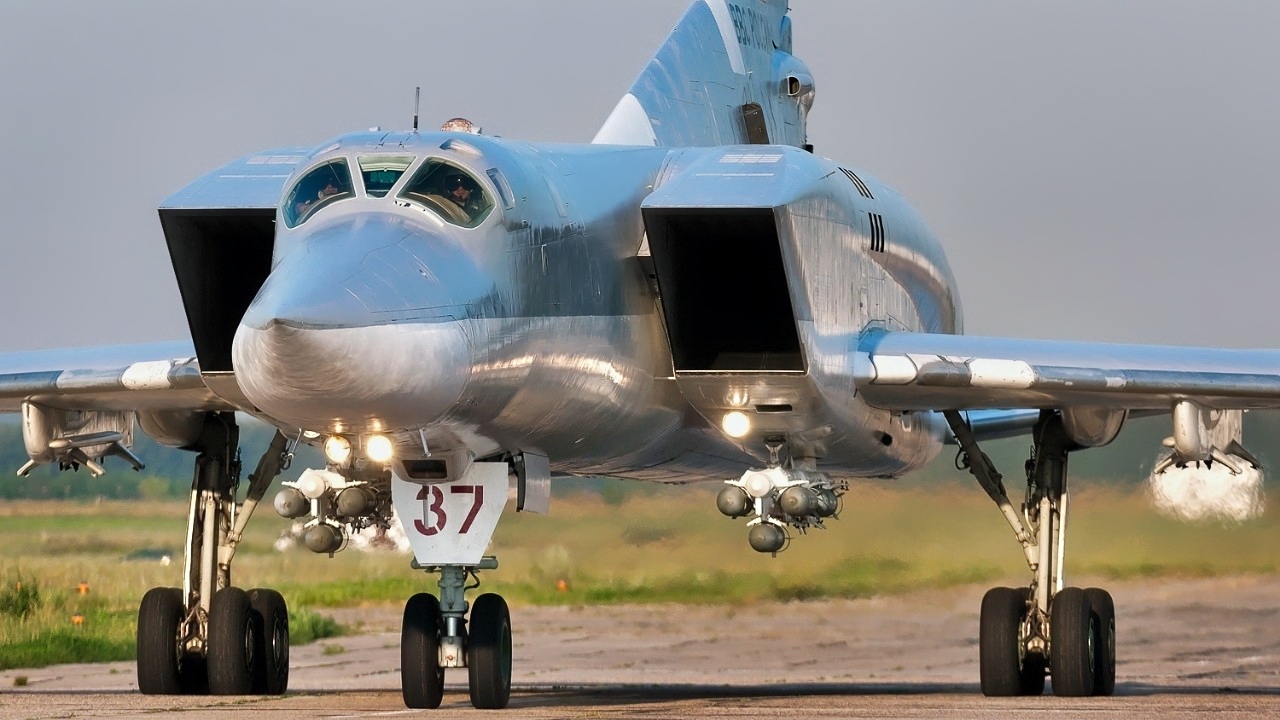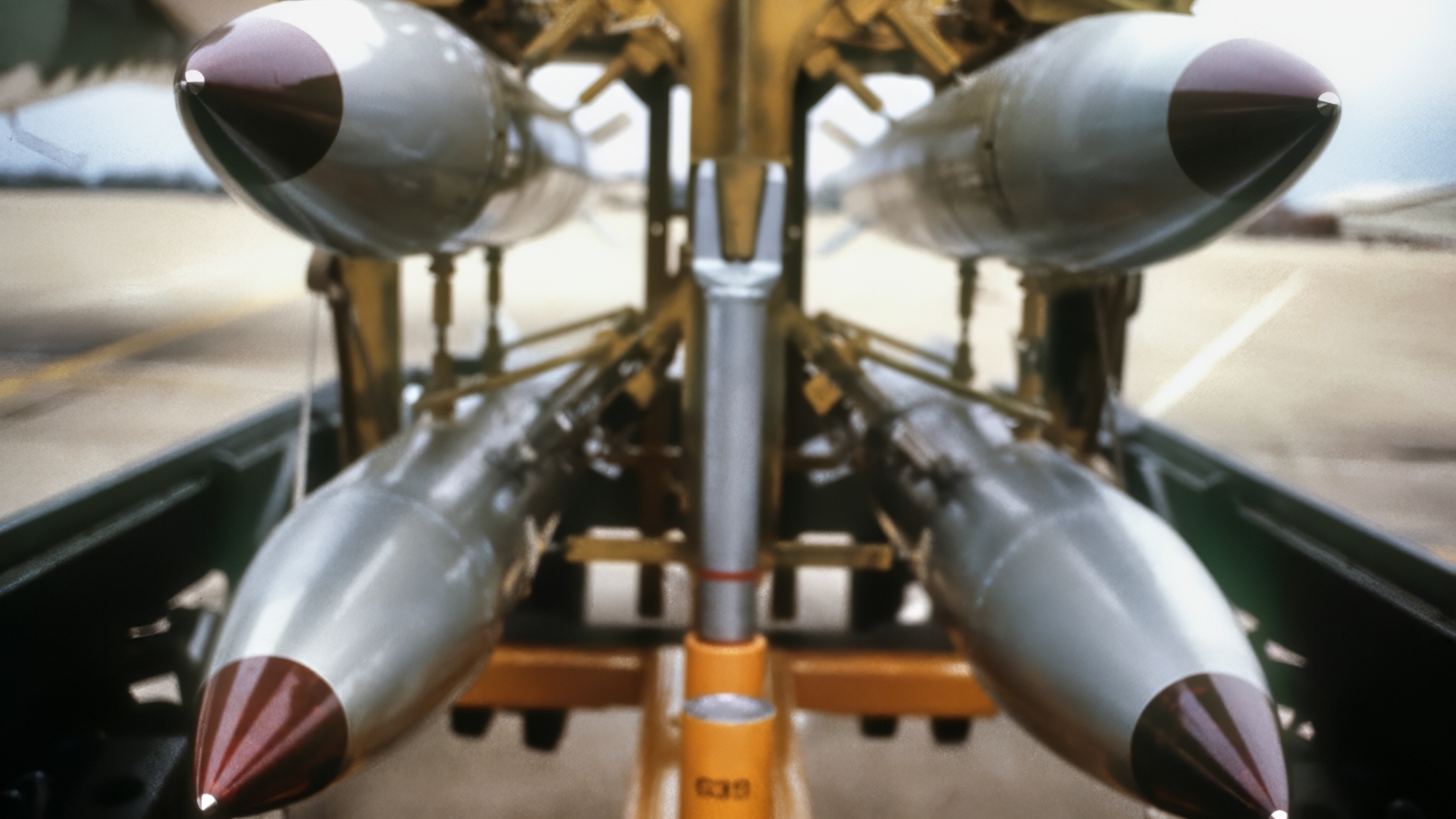Key Points and Summary – A Russian tactical nuclear strike in Ukraine is irrational and unlikely.
-Militarily, nukes offer little advantage: Ukraine’s growing Patriot PAC-3 MSE defenses can hit maneuvering warheads at “keep-out” altitudes, and each launch is improving intercept software.

Russia Tu-22M Bomber. Image Credit: Creative Commons.
-Strategically, fallout is huge—Beijing has warned Moscow, and Russia’s defense industry depends on Chinese components.
-Nukes wouldn’t “level cities” or change the front; tactical yields are limited, and Ukrainians would keep fighting. Politically, yielding to nuclear blackmail would upend global deterrence.
-Net: the costs and risks to Russia vastly outweigh any benefit—stop using nukes as an excuse to withhold support.
Would Russia Use a Tactical Nuclear Weapon in Ukraine?
WARSAW, POLAND – What are the chances that Russian President Vladimir Putin would use a tactical nuclear weapon in Ukraine?
Well, this is a question that someone from the non-defense and foreign policy literate part of the population asks at least once a week.
I have had to overcome the argument this fear provokes so many times that I sometimes wish I had committed the answer to memory. Then I could send the audio file to everyone’s smartphone, saving a lot of time and energy.
The short answer is that there is no scenario in which Putin or his military would derive any substantial benefit from using tactical nukes. On the contrary, the former KGB Lt. Col. would instead lose a great deal as a consequence of doing so. Whatever gains there might be for him or the cause of his armed forces are far outweighed by the negative repercussions.
But then the next predictable question is along the lines of “if the lacklustre one-time KGB officer loves hitting these Ukrainian cities and killing people, innocent people. Doesn’t using a nuclear weapon on a city kill many more Ukrainians? Wouldn’t that serve his purposes better?”

Tu-22M3 Bomber from Russia. Image Credit: Creative Commons.
Yes, I say, “you could kill more people—not necessarily many more—but more. However, there is a small problem in that a missile with a nuclear warhead mounted on it would have to make it through the Ukrainian missile defense network.”
Ukraine’s Missile Defense
Ukraine’s armed forces have an increasing number of the US-made Patriot air and missile defense system. The most capable of the three different effectors in that platform is the Missile Segment Enhancement (MSE) PAC-3 missile.
Even before the war, the MSE was already one of the best missile defense system interceptors in the world. What makes it so special is that it can adjust its trajectory to stay on course for a hit-to-kill (HTK) intercept – even if the missile it is targeted against has a maneuvering warhead.
HTK means that the MSE collides with the incoming missile head-on. In this instance, the kinetic energy created by that “one bullet hitting another bullet” destroys the enemy missile—literally melts it due to the intensely high temperatures that collision generates.
The MSE can also intercept any Russian missile with a nuclear, chemical, or biological warhead at what is called the “keep-out” altitude. This assures that none of the contaminants seep into the atmosphere. And since data from every single Patriot launch made in Ukraine or in Israel provides data on the Russian, Chinese, North Korean, or Iranian missiles, it is used against the US. Now, it knows far more about how to intercept those weapons than it did before the war in Ukraine began.

Tu-95 Bomber Russian Air Force. Image Credit: Creative Commons.
Using that data, the manufacturers of the missile and its guidance system have been able to make numerous improvements to its performance. It is a perfect example, as a Ukrainian defense publication points out, of how with many modern weapon systems, “significant performance gains can now be achieved through software updates rather than hardware overhauls. This approach allows armed forces to keep their systems relevant and adapt quickly to evolving threats.”
Too Many Downsides
Given the effectiveness of these Western systems, just how many nuclear-tipped tactical missiles would have to be fired for one of them to make it through to a target, if any?
Then there is a long list of other reasons why Russia using nukes in the war in Ukraine is a loser – too many to detail here. But just a few of the more significant ones are:
-Putin’s major backers would abandon him if he cannot continue the war without them. Financial Times sources, as well as numerous others, have stated that Chinese leader Xi Jinping has warned Putin against using nuclear weapons in a private conversation. Putin’s entire defense sector relies heavily on the People’s Republic of China (PRC) for most of the components used in the production of weaponry. Without China at his side, the Russian war machine grinds to a halt.
-As Pavel Podvig, head of the Russian Strategic Nuclear Forces project, has explained, “there are no purely military tasks that nuclear weapons can solve. Of course, you can destroy, for example, an airbase with one powerful strike instead of hitting it with several [conventionally-armed] missiles. Still, it will not affect the situation on the front as a whole.”
-The fact is that tactical nuclear weapons are not able to destroy entire cities or cause massive loss of life. As retired Lt. Gen. Ben Hodges is fond of saying, “you cannot kill 32,000 people with a tactical nuke—unless they are sitting in the same football stadium,” And no one is playing football while this war is on. People are not cloistered together like potatoes in a bin all day long in everyday life.
The US cannot afford to be intimidated by nuclear blackmail. If an adversary having nuclear weapons means we will not defend those they attack, then do we wave a white flag if North Korea invades the South, or if the PRC blockades the Republic of China on Taiwan, do we just say “oh, too bad—sorry we cannot help.” Do we run and hide if Iran acquires a nuclear weapon and threatens one of our European allies? Not exactly the kind of reputation for unreliability the world’s leading democracy wants to acquire.
What Happens Now?
But the final question: what is the likely impact on Ukraine’s military if the Russians used a nuclear weapon? Most of us who are familiar with the Ukrainian armed forces can answer that one. The answer is zero. They will keep on fighting. And then Putin has to worry about what the Ukrainians might do in retaliation. They could very easily do something far worse.
This all goes to say that there is just no compelling incentive for Russia to invoke the nuclear option. So, I wish people would stop asking, stop looking for excuses not to support Kyiv’s war effort, stop cowering in the corner and talking about escalation. I hope they would concentrate on assisting this brave nation in its struggle to rid itself of one of the most criminal and murderous invasion forces history has ever seen.
About the Author: Reuben F. Johnson
Reuben F. Johnson has thirty-six years of experience analyzing and reporting on foreign weapons systems, defense technologies, and international arms export policy. Johnson is the Director of Research at the Casimir Pulaski Foundation. He is also a survivor of the Russian invasion of Ukraine in February 2022. He worked for years in the American defense industry as a foreign technology analyst and later as a consultant for the U.S. Department of Defense, the Departments of the Navy and Air Force, and the governments of the United Kingdom and Australia. In 2022-2023, he won two awards in a row for his defense reporting. He holds a bachelor’s degree from DePauw University and a master’s degree from Miami University in Ohio, specializing in Soviet and Russian studies. He lives in Warsaw.
More Military
China Claims New J-35 Stealth Fighter Has Radar Cross-Section ‘Smaller Than a Human Palm’
The SR-71 Blackbird Mach 3 Bomber?
5 Reasons A U.S.-China War Could Start










